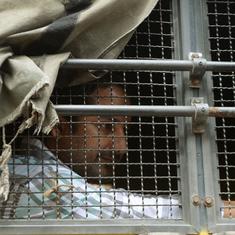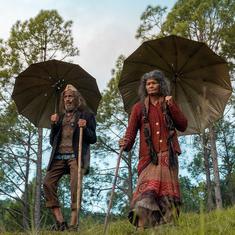Imagine seeing a nuclear reactor come up in front of your village, and living with the knowledge that the hot water released from it would destroy your traditional livelihood of fishing, or that a tsunami may cause it to leak as happened in Fukushima just five years ago. Imagine being fooled into selling your land cheap for the project – being told that it was to be a factory that would provide jobs.
For the last four-and-a-half years, the women of Idinthakarai village in Tamil Nadu have been sitting in protest against the Kudankulam nuclear power plant, which is just 2 km from their home. They want the reactor shut down. Its erratic performance since it started operations in July 2013, lends weight to their fears, but also to their conviction that God is on their side. The state’s only response to their sit-in has been mass arrests – 6,800 protestors were charged with sedition between September and December 2011, when the sit-in had just begun.
The ant and the elephant
Journalist Minnie Vaid’s latest book, The Ant in the Ear of the Elephant, is a record of this protest. Vaid had read the news reports about the police firing on protestors in September 2012. By then, the sit-in and hunger strike were already a year old. Her interest grew when she learnt that despite the death of a fisherman in that firing, the villagers had not given up the fast. She went to Idinthakarai village to find out why, and stayed on for eight days in the village hospital as there was not even a lodge there. Vaid travelled to six other villages also involved in the protests, and knew that the women’s testimonies had to be recorded. She took it upon herself to record them.
“I’m not giving voice to the voiceless,” said Vaid. “Those whose voices are deliberately suppressed – I am bringing their voices to the world.”
Two such voices were present at the launch of Vaid’s book in Mumbai last week, and the small crowd that turned up for the event were enriched by listening to them. In a chat with Scroll.in (conducted with the help of Tamil interpreter Sunitha Chitrapu), Milret said that she was only 16 when her mother took her to a protest when Rajiv Gandhi, who was then prime minister, was to lay the foundation stone of the plant. That was in 1988. Milret is 43 now, and is still fighting against the plant.
Sundari, 39, entered the movement in August 2011, when the villagers began their fast. A year later, she was among the 66 people who were arrested. Charged with sedition, she spent three months in jail.
Did she know the meaning of sedition? Sundari recounted that the judge had explained it to her as “desh-droh”.
“I asked him, ‘Have I sold my country’s secrets to Pakistan?’” said Sundari. “This government exists because I voted them; I don’t exist for them. I would support their policies, which let people live. Something that kills people is not development.’’
Asked Milret: “Where’s the war we are waging against the government?We’ve been peaceful throughout. It’s the government that tear gassed us. Even the gas was past its expiry date and made our lips swell up.”
All for the children
Female constables strip-searched Sundari at the time of her arrest, but what makes her break down is another memory. “The way the policemen were looking at us, I felt my sari was not enough to cover me,” she said. She has written a book on her experiences in jail.
Milret escaped arrest by jumping into the sea – she knew how to swim. While in the water, it struck her that her 17-year-old daughter, ill with jaundice and alone at home, may die. “But I told myself, the children of others will live if this reactor is stopped.”
Another time, her son, studying engineering in a city college, called her for an essential parent-teacher meeting. But leaving the village would have meant certain arrest. She didn’t go.
The women have learnt to live with such heartaches because, for them, the nuclear plant isn’t seen just as an immediate danger. “We’ve been to Kalpakkam and seen the damage the nuclear plant has done,” said Milret. “The Kudankulam reactor will destroy our reproductive organs, give us cancer. But we’ve lived our lives. What about our children?”
These were simple housewives till they saw on television the devastation wrought in Fukushima. Suddenly, what the scientist Uday Kumar had been telling them about the nuclear reactor in their neighbourhood made sense. Today, it’s the women who’ve taken on the scientist’s role, touring the country for support by explaining to people the dangers of not just Kudankulam, but all nuclear power plants.
“People tell us, ‘Don’t you want electricity?’” said Sundari. “We reply: ‘we need it the most, we have so many power cuts. But would anyone accept it if the government says, ‘you sacrifice a family member, we’ll give you electricity?'’”
The government had done nothing to “allay their fears”, a phrase Vaid finds meaningless. Queries filed under the Right to Information Act yielded nothing, but they found out through their own sources that the plant has used products from a Russian firm whose procurement director was arrested for corruption in 2012. Vaid tried to get an interview with the Nuclear Power Corporation of India for five months, in vain.
Vaid has written books on Binayak Sen, a doctor and civil rights activist working in rural Chhattisgarh who was convicted for sedition in 2010, and Irom Sharmila, on hunger strike against the Armed Forces Special Powers Act in Manipur for the last 15 years. She finds no difference in the way different ruling parties have treated dissent by using sedition as punishment. “I’m waiting for a humanitarian government,” said Vaid. “I’d love to write about that for a change!”
Said Milret: “Just because the government says something is safe, we can’t die for it. If you are so convinced that nuclear plants are safe, please build them in Chennai or Delhi.” At any rate, said Sundari, can a government that could not save its citizens from a rain-induced flood in Chennai, prevent a nuclear leak?
“All of us want to live, will anyone want to die?” said Sundari. “We would like to lead our lives in freedom, eat fresh fish and pray to Mother Mary in our church. That makes you beat us, but all your beatings only make us stronger. After us, our children will carry on the struggle.”
The Ant in the Ear of the Elephant, Rajpal Publishing.











